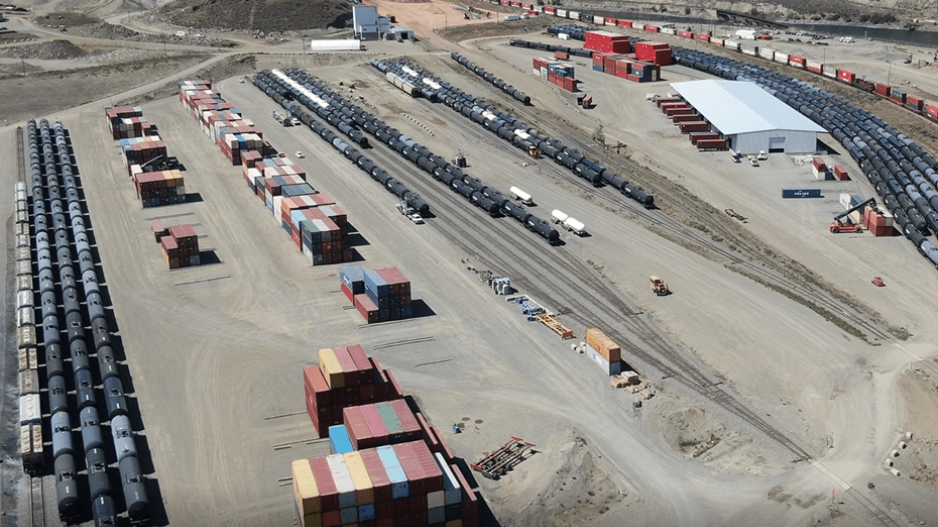A B.C. First Nation has filed a BC Supreme Court lawsuit claiming that the owners of B.C.’s largest inland cargo terminal are responsible for the destruction of its ancient ancestral village at the mouth of the Bonaparte River.
The Bonaparte First Nation’s (BFN) lawsuit, which also names the provincial and federal governments as defendants, alleges that Ashcroft Terminal Ltd. (ATL) deliberately misled the BFN about the construction of a 300-acre railway terminal at what the lawsuit claims is the site of a historical village that includes numerous ancestral burial grounds.
It claims that for more than 15 years, ATL has “concealed from BFN the true scope of [its] intentions to construct a more than 300-acre railway terminal at the site of the historical village and thereby scrape away the historical, cultural and spiritual values, materials and resources of BFN and the connection between BFN members and their ancestors.”
The lawsuit wants the court to halt construction of the terminal, which is only partially completed, and all future ATL construction activities until “the conclusion of a deep consultation and accommodation process, and compensation for past breaches of [BFN’s] right to consultation and accommodation.”
Ashcroft Terminal is a privately owned 320-acre inland trans-load and storage terminal 340 kilometres east of Vancouver and 90 kilometres west of Kamloops.
Known as dry ports, inland terminals help alleviate congestion at marine ports by handling import and export rail cargo offloaded from or destined for container ships docking at deepwater ports.
Ashcroft, which has been in operation since 1997, is the only inland port in Canada that has both Canadian Pacific Railway Ltd. (TSX:CP) and Canadian National Railway Co. (TSX:CNR) mainlines running through it.
In July 2018, Singapore-based port group PSA International Pte Ltd. (PSA) acquired a 60 per cent stake in Ashcroft Terminal’s business in Western Canada. Three years later, ATL and Canadian Tire Corp. (TSX:CTC) signed an investment agreement giving Canadian Tire a 25 per cent equity stake in Ashcroft.
Plans for ATL’s 300-acre railway terminal began in 2004. The project includes railway trans-load, storage and warehousing facilities as part of B.C.’s Asia-Pacific Gateway and international coastal rail shipping network.
In 2018, ATL announced the terminal project as a $28 million upgrade of its facilities. The federal government’s National Trade Corridors Fund provided a grant of $9.2 million for the project.
ATL estimated that the upgrade would generate 250 jobs.
The BFN’s lawsuit claims that ATL knew that the terminal’s construction would seriously disrupt more than 250 acresthat historically protected the First Nation’s ancestral village site, which “held high and archeological and cultural value for BFN.”
It also claims that the federal and provincial governments knew of BFN’s claim to aboriginal title to the village site lands and that none of the terminal project plans that ATL provided to them were ever given to BFN.
It further alleges that both senior governments provided millions of dollars in grants and subsidies for the railway terminal and knew that it would have a significant impact on BFN’s interests and ancestral and burial sites.
The lawsuit therefore claims that both governments knowingly “breached their duties to consult and accommodate BFN.”
In addition to an order stopping further construction on the railyard terminal project, the lawsuit seeks general, special, aggravated and punitive damages.
It is also seeking orders declaring that the federal and provincial governments breached their duties to consult and accommodate BFN.
In its response to the BFN civil claim filed in BC Supreme Court on May 12, ATL stated that the plaintiff has been extensively engaged “throughout the development of the inland terminal.”
It denied that the defendants have made any misrepresentations to the BFN regarding the scope of the terminal expansion project.
In a statement distributed to its stakeholders, ATL noted that the terminal property, which it has owned since 2005, has been held in fee simple by various owners since 1886. ATL has been developing the property primarily in response to “an increase in the number of customers and their increased capacity requirements.”
ATL, according to the company’s statement, “has been transparent with its development plans and … [its] operations have been lawfully conducted, with all necessary permits and licences, and [have complied] with all requirements of B.C.’s Heritage Conservation Act.”
It added that ATL has “been engaging with Bonaparte First Nation and other First Nations for over a decade on all archaeological work.”
The company’s statement estimated that ATL has “contracted over 10,000 hours of Indigenous field work on the property.”
twitter.com/timothyrenshaw




